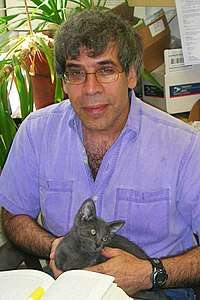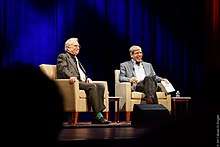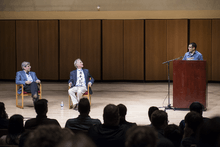Jerry Coyne
Jerry Allen Coyne (born December 30, 1949) is an American biologist known for his work on speciation and his commentary on intelligent design. A prolific scientist and author, he has published numerous papers elucidating the theory of evolution. He is currently a professor emeritus at the University of Chicago in the Department of Ecology and Evolution. His concentration is speciation and ecological and evolutionary genetics, particularly as they involve the fruit fly, Drosophila.[5]
Jerry Coyne | |
|---|---|
 Coyne at the University of Chicago, August 2006, with the "lab cat"[1] Dusty. | |
| Born | Jerry Allen Coyne December 30, 1949 |
| Nationality | American |
| Alma mater | College of William & Mary, Harvard University (Ph.D) |
| Known for | Speciation and evolutionary genetics, particularly as they involve the fruit fly, Drosophila, and the books:
|
| Awards |
|
| Scientific career | |
| Fields | Ecology and Evolution |
| Institutions | University of Chicago, University of Maryland |
| Doctoral advisor | Richard Lewontin |
| Notable students | H. Allen Orr, Mohamed Noor |
| Influences | Bruce Grant, Richard Lewontin |
| Website | WhyEvolutionIsTrue |
| Notes | |
He is the author of the text Speciation and the bestselling non-fiction book Why Evolution Is True.[6] Coyne maintains a website and writes for his blog, also called Why Evolution Is True.[7] He is a hard determinist.[8]
Coyne gained attention outside of the scientific community when he publicly criticized religion and is often cited with atheists such as Richard Dawkins and Sam Harris. He is the author of the book Faith vs Fact: Why Science and Religion are Incompatible. Coyne officially retired in 2015.[9]
Scientific work
Coyne graduated with a B.S. in biology from the College of William & Mary in 1971. His graduate work at Rockefeller University under Theodosius Dobzhansky was interrupted when he was drafted. He then earned a Ph.D. in biology at Harvard University in 1978, studying under Richard Lewontin, and went on to do a postdoctoral fellowship at the University of California, Davis with Timothy Prout. He was awarded the Guggenheim Fellowship in 1989, was elected to the American Academy of Arts and Sciences in 2007, and received the "Emperor Has No Clothes" award from the Freedom from Religion Foundation in 2011.[10]
Coyne has served as President (2011) and Vice President (1996) of the Society for the Study of Evolution, and as Associate Editor of Evolution (1985–1988; 1994–2000) and of The American Naturalist (1990–1993). He has taught evolutionary biology, speciation, genetic analysis, social issues and scientific knowledge, scientific speaking and writing. He considers evolutionary biology to be "... more like the fine arts of science, in that it's aesthetically quite satisfying, but it also happens to be true, which is an extra bonus."[9]
His work is widely published in scientific journals as well as in such mainstream venues as The New York Times, the Times Literary Supplement, and The New Republic. His research interests include population and evolutionary genetics, speciation, ecological and quantitative genetics, chromosome evolution, and sperm competition.
Coyne is a critic of creationism, theistic evolution, and intelligent design, which he calls "the latest pseudoscientific incarnation of religious creationism, cleverly crafted by a new group of enthusiasts to circumvent recent legal restrictions".[11][12][13][14]
He is concerned about a disconnect between what the public believes about evolution and what scientists believe about evolution. He states the value of studying evolution is in the true story of our origins and its value in restoring wonder in people.
In a 1996 critique of the theory of intelligent-design creationism, Coyne wrote his first large New Republic article on Of Pandas and People (a book review), which started a long history of writing on evolution and creationism.[15]
Coyne lists the following evidence for evolution, as detailed in his book and elsewhere:[16]
- Fossil record
- Embryology
- Molecular biology
- Presence of vestigial organs
- Biogeography
- Sequence similarity between species that are also observed as a time-dependent change in junk DNA
Transitional fossils provide rich evidence for evolution.[17] Charles Darwin predicted such fossils in 1859, and those later identified as such include:[16]
- Tiktaalik (transition between fish and amphibians)
- Ichthyostega (transition between amphibians and reptiles)
- Mammal-like reptiles (not classified one or the other)
- Archaeopteryx (transition between reptiles and birds)
- Ambulocetus (transition between land mammals and whales)
- Early human fossils with ape-like skulls
- Series of terrestrial fossils between land animals and whales
The evidence not only includes these transitional fossils but the fact that they occur in the fossil record at times between their putative ancestors and their more modern relatives.[16]
The Ecuadoran frog Atelopus coynei is named after Coyne. He collected the holotype in a swamp on a frogging trip to western Ecuador as a student in the late 1970s.[18]
Atheism

Born to Jewish parents, Coyne considers himself a secular Jew,[19] and an outspoken anti-theist. He supports the theses of metaphysical naturalism and the conflict thesis. He claims that religion and science are fundamentally incompatible, that only rational evaluation of evidence is capable of reliably discovering the world and the way it works, and that scientists who hold religious views are only reflective of the idea, "that people can hold two conflicting notions in their heads at the same time" (cognitive dissonance). He has argued that the incompatibility of science and faith is based on irreconcilable differences in methodology, philosophy, and outcomes when they try to discern truths about the universe.
As well as evolution-related topics, his blog Why Evolution Is True, which has over 50,000 subscribers as of January 14, 2018, discusses subjects spanning science, medical ethics, atheism, determinism, philosophy and free speech.[9] He has frequently participated in public forums and cross-fire debates with theists.[20]
Pseudoscience critic


Coyne comments and responds to critics of science and evolution. In a rebuttal, he clearly identifies his reasons for skeptical reasoning.[21]
all scientific progress requires a climate of strong skepticism.
— J.A. Coyne, The New Republic
He offers criticism of creationists who appear closed minded by adhering to a literal Biblical view. He questions the creationist concept of animals diverging only within kinds, which is in itself an admission of transitional intermediates between very different groups (i.e., whales and their terrestrial relatives) found throughout the fossil record.[22]
we have many examples of transitional fossils between what anyone would consider different kinds: fish and amphibians (like Tiktaalik, which Nye mentioned), between amphibians and reptiles, between reptiles and mammals, between reptiles and birds, between land animals and whales, and of course, between early and modern humans, with early fossils showing intermediacy between the features of apelike ancestors and modern humans.
— J.A. Coyne, The New Republic
Coyne believes that both sides of such debates between evolutionists and young earth creationists could benefit from a better understanding of the fossil record and for modern tools such as Isochron dating. He considers that the inability of creationists to address these subjects fully suggests that "religion can poison one's mind so deeply that it becomes immunized to the real truth about the cosmos."[22]
He is also a critic of the Neurodiversity movement, claiming that in its extreme, neurodiversity wishes to deny medical treatment for any person with a mental condition, particularly autism, even if the person wants a medical treatment.[23]
Politics and free speech
Coyne considers himself to be a "traditional Liberal" and has a long history of activism. He was arrested, when he was in college, for delivering a letter to the South African embassy against apartheid.[9] He also protested regularly against the Vietnam War. Coyne has expressed disapproval of the way some contemporary liberals are "trying to shut people up."[9] He believes in free speech for all and does not like seeing universities cancel speakers, such as Steve Bannon, because of protests. "I can't think of a single person I would urge the University to disinvite. Not a single person-not a white racist, not an anti-immigration person. Free speech has to defend the most odious people."[9]
Coyne believes in social justice but feels that identity politics have turned into identity tactics. He believes in the 1960s movements for black civil rights and women's rights, since they represent victimhood that "... was not something to be proud of, but something to be fought against. Now it's something to be proud of, I think, because it enables you to get attention and to be able to say others in the hierarchy can't speak, that they don't have opinions worth considering."[9]
Determinism
Coyne came to believe in the idea of determinism after reading a paper by Anthony Cashmore on determinism and the criminal justice system. He states that recognising there is no free will makes one more empathetic and less judgmental: "A lot of politics—particularly Republican politics—is based on the supposition that people are responsible for their own lives. So, for example, people who are on welfare, or homeless people, are treated as if they could have done otherwise. They could have gotten a job, they could have gotten married and had a father for their kids. But they couldn't, because they're victims of circumstance."[9]
Personal
Since retiring, according to a February 14, 2018 article in The Chicago Maroon, Coyne still goes to his lab every day and publishes more now than he did in his academic career. Within the lab are many inscriptions, that Coyne encouraged, on a cabinet signed by postdocs and researchers who came to work on a holiday or a special occasion.[9]
In 2017, Coyne noticed a female duck and her ducklings in the University of Chicago's Botany Pond; he named the mother Honey, and fed them until they migrated. Honey has returned each year since, and Coyne has continued to take an interest in the ducks breeding in the University of Chicago's Botany Pond and has fed them and their offspring.[24]
Publications
Noteworthy scientific papers
Coyne's peer-reviewed scientific publications include numerous papers in Nature, Science and other journals. He is a prolific author and commentator, with many hundreds of technical presentations, invited commentaries, and miscellaneous publications. Of particular focus are publications related to evolution, the origin of species, evolutionary genetics, and associated theories.
Books
- Coyne, Jerry A.; H. Allen Orr (2004-06-30). Speciation. Sinauer Associates Inc., Sunderland, Mass. ISBN 978-0-87893-089-0.
- Coyne, Jerry A. (2009-01-22). Why Evolution is True. Viking, New York (USA); Oxford University Press, Oxford (UK). ISBN 978-0-19-923084-6. OCLC 233549529.
- Coyne, Jerry A. (2015-05-19). Faith vs. Fact: Why Science and Religion are Incompatible. Viking (USA); Penguin (UK). ISBN 978-0670026531.
The New Republic
- "The faith that dares not speak its name: The Case Against Intelligent Design.", The New Republic
- "Ann Coulter and Charles Darwin. Coultergeist.", The New Republic
- "Seeing and Believing: The never-ending attempt to reconcile science and religion, and why it is doomed to fail.", The New Republic
- The Great Mutator", The New Republic (Review of Michael Behe's The Edge of Evolution)
Other
- "A Letter to Charles Darwin" OUP Blog (celebrating the 200th anniversary of Darwin's birth)
- Coyne's announcement on his blog that he was retiring from teaching and academics, September 30, 2015. As a Professor Emeritus, he continues to write, lecture and travel.
References
- "Cat travel week: home again (lab cats)". 2010-09-17. Retrieved 17 August 2014.
- Jerry A. Coyne; H. Allen Orr (2004). Speciation. Sinauer Associates, Incorporated Publishers. ISBN 978-0-87893-089-0.
- Jerry A. Coyne (22 January 2009). Why Evolution is True. Oxford University Press. pp. 8–. ISBN 978-0-19-164384-2. Retrieved 24 January 2014.
- Jerry A. Coyne (2015). Faith versus Fact: Why Science and Religion Are Incompatible. Viking Press. p. 311. ISBN 978-0-670-02653-1.
- "Jerry Coyne". Edge.org. 2013. Retrieved 2014-01-24.
- "Best Sellers Hardcover Nonfiction". The New York Times. Retrieved 22 February 2014.
- Jerry, Coyne. "Why Evolution Is True". Jerry Coyne. Retrieved 25 January 2014.
- "You don't have free will", Vancouver, June 2015
- Harris, Lee. "Meet Jerry Coyne, the University's Most Prolific and Provocative Emeritus Blogger". The Chicago Maroon. The Chicago Maroon. Retrieved 14 February 2018.
- "Freedom of Religion Foundation, Emperor Has No Clothes Award". Retrieved 8 June 2019.
- Coyne, Jerry (February 12, 2009). "Why Evolution Is True". Forbes. Retrieved 2009-06-20.
- Coyne, Jerry (2009-01-21). "DOES THE EMPIRICAL NATURE OF SCIENCE CONTRADICT THE REVELATORY NATURE OF FAITH?". Edge.org. Edge.org. Retrieved 18 August 2014.
- Zepps, Josh (June 16, 2006). "Jerry Coyne - The Case Against Intelligent Design". Point of Inquiry. Retrieved 23 January 2014.
- Coyne, Jerry (July 1, 2007). "The Faith that Dare Not Speak its Name" (PDF). The New Republic. Retrieved 2007-07-29.
- Smith, Adrian A. "Episode 7 Jerry Coyne". Age of Discovery Podcast. Archived from the original on 4 March 2015. Retrieved 3 February 2014.
- Coyne, Jerry (2010). Why Evolution is True (second ed.). USA: Viking Penguin. p. 50. ISBN 978-0-14-311664-6.
- Andrews, Seth. "Why Evolution is True (with Dr. Jerry Coyne)". Retrieved 18 February 2014.
- C. Michael Hogan (2013). "Atelopus coynei: Faisanes Stubfoot Toad". AmphibiaWeb. University of California, Berkeley. Retrieved 5 May 2020.
- Jerry, Coyne (2013-04-12). "Stupid religious rule #11734, and a note on my ancestry". whyevolutionistrue.com. Jerry Coyne. Retrieved 8 February 2014.
- Jerry, Coyne (2012-11-29). "Ceci n'est pas un blog". whyevolutionistrue.com. Retrieved 25 January 2014.
- Chopra, Deepak; Jerry A. Coyne (November 18, 2013). "Deepak Chopra Responds to Pseudoscience Allegations. Jerry Coyne Fires Back". The New Republic. Retrieved 25 January 2014.
- Jerry, Coyne (2014-02-05). "Bill Nye Won Last Night's Creationism Debate". The New Republic. Retrieved 5 February 2014.
- Coyne, Jerry (23 June 2015). "What do we do about "neurodiversity"?". Why Evolution Is True. Retrieved 1 October 2018.
- Schmich, Mary (31 March 2020). "Column: The pandemic, a professor and a duck named Honey: A story of life in a time of death". Chicago Tribune. Retrieved 10 May 2020.
External links
| Wikimedia Commons has media related to Jerry Coyne. |
| Wikiquote has quotations related to: Jerry Coyne |
- Why Evolution is True
- Faculty website at the University of Chicago
- List of publications on Google Scholar
- 'Why Evolution Is True' by Jerry Coyne, April 14, 2012, video at ExChristian.net, 57 minutes.
- Video Lecture Why Evolution is True and Why Many People Still Don’t Believe It at Harvard University Museum of Natural History (Hosted by Vimeo), May 2, 2012, page includes lectures by Jack W. Szostak, Iain Couzin, and Randolph Nesse, 75 minutes.
- Q&A with Jerry Coyne (along with Mohamed Noor) Sep 11, 2012 on YouTube, 30 minutes. (

- Meet the Amazing TAMers: Jerry Coyne Part 1 on YouTube(interview by Joel Guttormson, Outreach and Event Coordinator for the Richard Dawkins Foundation for Reason and Science) Dec 16, 2013, 8 minutes. (

- Meet the Amazing TAMers: Jerry Coyne Part 2 on YouTube(interview by Joel Guttormson, Outreach and Event Coordinator for the Richard Dawkins Foundation for Reason and Science) Dec 16, 2013, 4 minutes. (

- Meet the Amazing TAMers: Jerry Coyne Part 3 on YouTube(interview by Joel Guttormson, Outreach and Event Coordinator for the Richard Dawkins Foundation for Reason and Science) Dec 16, 2013, 7 minutes. (

- Podcast with his friend Sam Harris